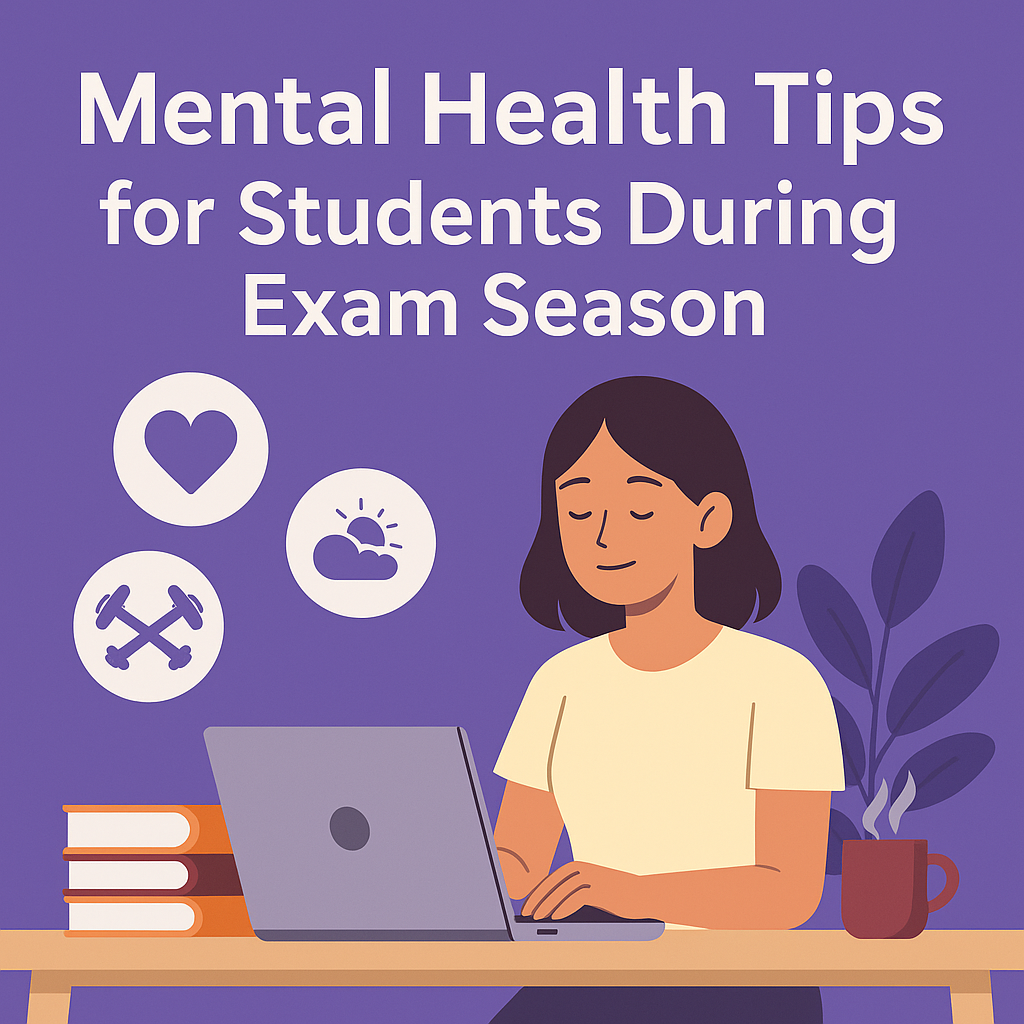 Let’s be honest — exam season is stressful for everyone. Sleepless nights, endless coffee, and the pressure to perform can make even the most motivated students feel anxious and exhausted.
Let’s be honest — exam season is stressful for everyone. Sleepless nights, endless coffee, and the pressure to perform can make even the most motivated students feel anxious and exhausted.
But taking care of your mental health during exams is just as important as studying. In fact, research shows that students who manage stress effectively perform better academically and retain information longer.
In this article, we’ll explore practical, science-backed mental health tips to help you stay calm, focused, and confident during exam season — no matter how intense things get.
1. Acknowledge That Stress Is Normal
The first step to managing exam stress is to understand that it’s completely normal.
A little bit of stress can even help you stay alert and motivated. The key is not to eliminate stress, but to manage it so it doesn’t become overwhelming.
Quick tip: When you feel anxious, take a deep breath and remind yourself,
“I’ve prepared for this. I can handle it.”
This small affirmation helps reframe your mindset from panic to focus.
2. Create a Study Schedule That Includes Breaks
Cramming the night before is the fastest way to burn out. Instead:
Divide your study material into smaller sections.
Use a study planner or app like Notion or Google Calendar.
Schedule 10–15 minute breaks after every 45–60 minutes of studying.
Why it works: Regular breaks improve memory retention and prevent fatigue.
Pro tip: Use the Pomodoro Technique — 25 minutes of focused study followed by a 5-minute break.
3. Prioritize Sleep (Seriously!)
Many students sacrifice sleep to study longer — a huge mistake.
Sleep isn’t wasted time; it’s when your brain processes and stores what you’ve learned.
Aim for 7–8 hours per night.
Avoid screens an hour before bed (blue light disrupts sleep).
Keep your sleep schedule consistent, even on weekends.
A well-rested mind remembers more than a tired one ever could.
4. Eat Brain-Boosting Foods
What you eat affects how you feel and think.
During exam season, fuel your body with foods that support focus and calmness:
Healthy fats: Avocado, nuts, and olive oil boost brain power.
Omega-3s: Found in salmon or flaxseed, help with memory.
Antioxidants: Blueberries, oranges, and green tea fight stress.
Stay hydrated: Even mild dehydration reduces focus.
Avoid too much caffeine and sugar — they cause energy crashes and anxiety.
5. Move Your Body
Exercise isn’t just for fitness — it’s one of the most effective natural stress relievers.
A 20-minute walk, yoga, or even stretching between study sessions can release endorphins that instantly lift your mood.
Try these quick options:
Walk around campus while listening to music.
Follow a short YouTube workout.
Do deep breathing or meditation stretches.
Movement clears your mind and recharges your focus.

6. Practice Mindfulness and Meditation
Mindfulness helps you stay grounded in the present moment instead of spiraling about what might go wrong.
Even 5 minutes a day can lower stress and boost concentration.
Try apps like Headspace, Calm, or Insight Timer for guided meditation.
Practice simple breathing: inhale for 4 seconds, hold for 4, exhale for 4.
Pro tip: When studying, try to focus fully on one task — no multitasking, no phone.
7. Stay Connected — Don’t Isolate Yourself
When exams hit, many students go into “study lockdown.”
But cutting off social connection can increase loneliness and anxiety.
Reach out to friends — even short conversations or group study sessions can make a big difference.
Study together online or in person.
Vent your stress — sometimes saying it out loud helps.
Encourage each other; teamwork builds motivation.
“You’re not alone — everyone’s feeling the pressure. Let’s get through this together.”
8. Avoid Comparison
Comparing yourself to others (“They’ve already finished three chapters!”) only fuels anxiety.
Remember: everyone learns differently. Focus on your own pace and goals.
Tip: Unfollow accounts or group chats that trigger stress, and curate your social media feed for positivity.
9. Use eBooks and Digital Tools to Study Smarter
eBooks make studying more flexible and efficient — especially during finals.
Easily search topics instead of flipping through pages.
Highlight key points digitally.
Study anywhere — no heavy backpack required.
You can find affordable, instantly downloadable academic eBooks on CSTBooks.com — designed for busy students like you who want to save time and stress less.
10. Seek Help When You Need It
There’s no shame in asking for help.
If you’re feeling constantly anxious, sad, or unmotivated, reach out for support:
Talk to your school counselor or mental health center.
Call a helpline (like the 988 Suicide & Crisis Lifeline in the U.S.).
Share your feelings with a trusted friend or family member.
Remember: getting help isn’t a weakness — it’s a sign of strength.
Exam season can test your limits — but it doesn’t have to break you.
By managing your time wisely, prioritizing your mental health, and staying connected, you can make it through exams feeling focused, confident, and balanced.





